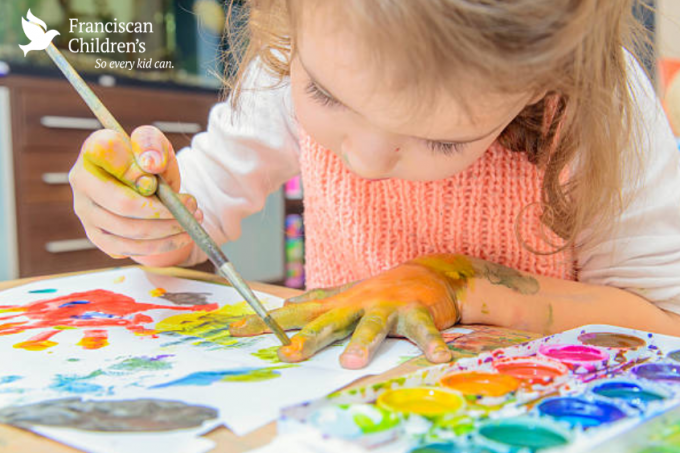How to Transition Your Child From School Year to Summer Vacation

As the school year comes to an end, it’s time to prepare for the transition into summer break. While the freedom of summer fuels kids’ excitement, the end of the school year can bring mixed feelings for parents… and even kids! Shifting kids into new routines without disrupting their current schedules can be challenging. Too many adjustments at once can lead to behavioral changes, worries and anxieties, but there are steps you can take to make the transition as smooth as possible for your family.
Maintain Routines:
Although your child will no longer be going to and from school each day, it’s still beneficial to keep aspects of their day on a schedule. Experts recommend that they should still maintain consistent wake-up, meal and bed times.
“Ideally kids sleep schedules should remain consistent from school nights to summer,” says Dr. Gregory Young, Pediatric Psychologist at Franciscan Children’s. “Some children will naturally stay up later in the summer, using video games and various technologies late at night, but this can create negative routines that may continue into the school year.”
Having consistent routines and minimizing children’s down time proves not only beneficial for their physical health but also their mental well-being. “Although a decreased structure for a short time may seem relaxing to adults, it can actually cause increased anxiety and behavioral problems for children,” says Dr. Young.
With the unpredictability that summer schedules can bring, having certain consistencies can allow kids to maintain a sense of stability. Summer routines can also make the transition back into the school year much easier for both you and your child.
Balance Family & Friends:
The summer season is ideal for families to take advantage of vacation time to plan trips and engaging activities together to reconnect. These opportunities are especially important for teens that gravitate more towards their friends and less towards their family. Kristan Bagley-Jones, Director of the Children’s Wellness Initiative at Franciscan Children’s, reminds parents, “Be prepared for your teen to be upset at the idea of leaving their ‘second family’ (i.e. their friends) when you plan trips.”
While dedicated family time matters, it’s also important to allow kids and young teens to build relationships with their friends. Younger kids are just starting to build crucial social skills, so it’s beneficial to allow them to continue play dates, phone calls or even FaceTime sessions with their peers. If kids are able to maintain their friendships with other students over the summer it will aid in their transition back to school.
Lessening the number of new social variables kids experience at once will make for a more positive summer to school switch. “If your child will be attending camp for the first time, help them role play how to meet new kids,” says Kristan. Understanding how to build new friendships is an important social skill for children to learn but can take some practice.
Continue the Learning Experience:
Make learning fun! A formal curriculum is not necessary to continue your child’s education outside the classroom. Before the school year ends, talk to your child’s teacher. Ask what subjects and activities they really enjoyed throughout the year. This will give you a good idea about different activities they’d enjoy continuing through the summer months.
You can also incorporate learning into every day experiences. Allowing your child to cook, bake or do puzzles with you provides an opportunity to improve their math and problem solving skills. Children can also express their creativity by starting a journal. Let them decorate the journal cover and give them the freedom to draft creative stories or write about summer adventures and memories.
“Remember, being creative isn’t just about fun, it can foster self-awareness, self-expression, and interpersonal skills,” says Ashley Weaver, Expressive Therapy Program Coordinator at Franciscan Children’s. “When integrated in to learning, these skills can help children self-regulate, express thoughts, feelings, and emotions, and build a foundation for happy, healthy relationship.”
Continuing their learning experiences in the summer months can greatly help your child transition back into learning mode come September. “This summer, encourage and join your child in a creative art project, singing or even writing music together, making up a dance, or writing and telling stories,” says Ashley. “Engaging your child’s imagination and creativity will not only be a fun way to spend time together, it will allow avenues for them (and you) to practice positive self-expression.”
Gregory Young, Ph.D., LABA, BCBA, is a Pediatric Psychologist in the Outpatient Mental Health department at Franciscan Children’s. Our multidisciplinary team provides comprehensive and integrated mental and behavioral health services to our community and local schools with the goal of creating a meaningful therapeutic environment for each child and family. To make a referral, please call 617-254-3800 ext. 3141.
Kristan Bagley-Jones, LICSW, is the Director of the Children’s Wellness Initiative (CWI) at Franciscan Children’s. CWI provides school-based mental health counseling combined with outreach, education and prevention services. For more information, please contact Kristan at 617-254-3800 ext. 3040.
Ashley Weaver, LMHC, R-DMT, is the Expressive Therapy Program Coordinator at Franciscan Children’s. Out Expressive Therapists integrate with multidisciplinary teams across Franciscan Children’s to work toward individual behavioral and mental health goals using visual art, music, drama and dance/movement.
View All Blog Stories